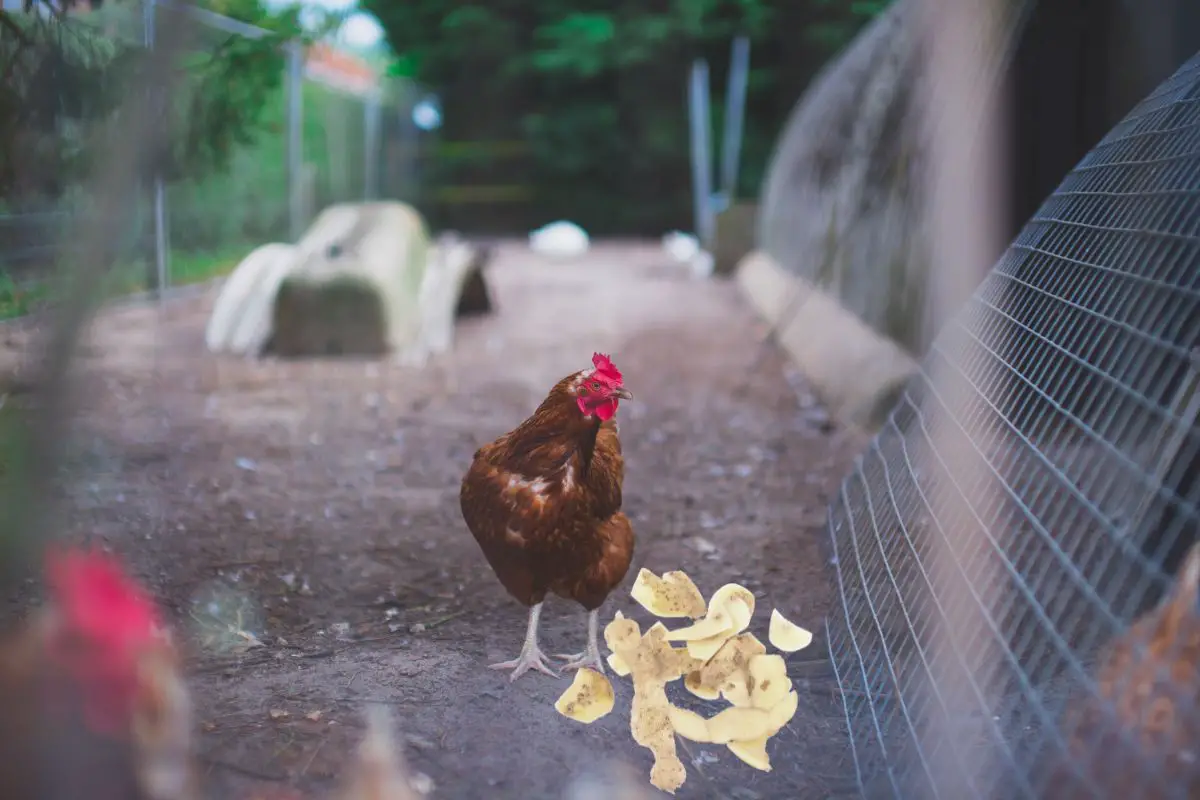Chickens can only eat potato skins if they are freshly cooked. Raw potato skins, green potato skins, potato eyes and sprouting potatoes are toxic to chickens.
It is enticing to feed table scraps like potato peels to backyard chickens because they are convenient to provide as a snack. Potatoes are a nutritious staple that are both cheap and widely available, and are routinely found in gardens and prepared in homes all over the world.
Even though people are encouraged to eat the entire potato, they often remove the potato peel. This means there are lots of potato skins leftover after preparing potatoes.
What can you do with those potato peelings? Are they safe to provide to your chickens?
This article will discuss the humble potato skin, the macronutrients and health benefits of potato skin, and cover the potential dangers that can lurk inside potato peels if fed to chickens.
Table of Contents
Is it Dangerous to Feed Potato Skins to Chickens?
Freshly potato skins are safe for chickens to eat, while raw potato skins are not. A better idea would be to put your raw potato peels into your compost pile so they don’t go to waste.
White potatoes include yellow, brown, and red potato varieties. When these types of potatoes are improperly stored or have access to sunlight, they may turn green.
Green potatoes are poisonous for chickens as they contain solanine, a toxic compound that can cause illness and death. Green potato skins (and any green parts of a potato) have the most solanine and you should never feed them to chickens.
White potatoes are members of the nightshade family and the most dangerous part of the nightshade family that contains solanine is the plant itself. Sprouting potatoes and potato eyes are also incredibly dangerous so never feed these potato skins or flesh to your chickens.
Other dangerous foods you should never give to chickens include:
- Dried Beans
- Uncooked Rice
- Junk Food
- Coffee Grounds
- Moldy foods
- Citrus
Here is a complete list of foods to avoid:
Whenever you want to offer a new food to your chickens as a treat, be sure to look up the nutritional content and safety of that food. This can potentially save the lives of your flock.
Are Sweet Potato Skins Safe for Chickens to Eat?
Sweet potato peels (and every part of a sweet potato) are safe to give to your chickens as long as they aren’t moldy.
Sweet potatoes have just as many health benefits as white potatoes, and even more fiber – so feeding chickens sweet potatoes is a great idea.
Just ensure the potatoes are properly washed to dispose of any potential pesticides and cooked thoroughly to rid them of toxins.
Are Yams and Yam Skins Safe for Chickens?
Yams are actually different from both potatoes and sweet potatoes. Yams grow in the Caribbean and have a scaly skin rather than a smooth one like a sweet potato.
Yams are okay to give to chickens if they have been cooked, but raw yams and yam skins can be toxic to chickens.
What Health Benefits do Potato Skins offer Chickens?
Choosing foods for their nutritional value and safety is vital when crafting your chickens’ diet. Free-range chickens typically require less supplemental nutrients than confined birds, but it’s always important to ensure their nutritional needs are being met.
Potatoes are nutritious and feeding chickens potato is okay if they are cooked. However, it is important to only provide them in moderation, as they are a starchy food high in carbohydrates.
Some of the important vitamins and minerals in potato skins include:
- Vitamin C
- Antioxidants
- Iron
- Fiber
- Potassium
- Magnesium
- Vitamin B6
- Thiamin
- Niacin
These nutrients help the nervous system, cardiovascular system, and immune system and are important as part of a balanced diet for your chickens.
However, chicken feed should make up 90% of a chicken’s diet and supplements like fruits and veggie kitchen scraps should make up the rest. You should always provide grit for your chickens so they can digest these wonderful foods that you provide.

